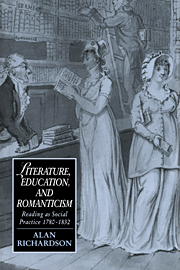Preface
Published online by Cambridge University Press: 08 February 2010
Summary
Commenting on his generation's unique experience of social change and dislocation, De Quincey considered that “fifty years of mighty revolutions amongst the kingdoms of the earth” only began to account for the “agitation” of British life from the 1790s to 1845. Other epochal shifts included the rapid spread of industrialization (epitomized by the rise of steam power), a host of new technologies, developments in artillery evoking “powers from hell,” and, as though in response, “powers from heaven descending upon education and accelerations of the press.” It is this last area – the transformation of education and, with it, of literature in all its forms – that makes the subject of this book. Although little has been written on the consequences for both literary practice and everyday life of the changes in schooling, in the spread of literacy, and in the publishing industry which so marked what we call the Romantic era, a list of notions now taken for granted which were first widely aired, if not codified, during the years 1780–1832 should suggest the force and extent of what amounts to a cultural revolution.
- Type
- Chapter
- Information
- Literature, Education, and RomanticismReading as Social Practice, 1780–1832, pp. xiii - xviPublisher: Cambridge University PressPrint publication year: 1994

